Learning and knowledge sharing are fundamental to the LHSS Project. We invite you to search LHSS knowledge products and resources for the latest approaches, insights, and learning in the field of integrated health systems strengthening.
The Government of Jamaica and LHSS officially launch One Health approach in Kingston, focusing on intersectoral collaboration to address health threats across sectors.
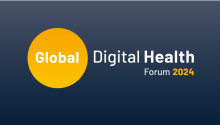
The Global Digital Health Network will once again convene the Global Digital Health Forum this December 4-6, 2024, in Nairobi, Kenya and worldwide, online.
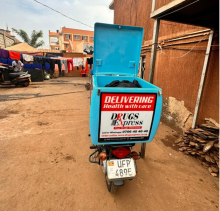
With a small grant and technical support from LHSS, a Ugandan pharmacy and logistics company, MM Partners Logistics Ltd., expanded its e-Pharmacy platform to include more family planning products and increased the capacity of its dispensing staff to provide better counsel to clients on reproductive health and family planning.
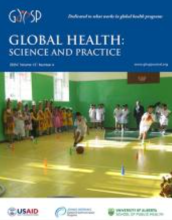
.A validated, streamlined set of metrics can help the HIV community drive toward such a “people-centered” orientation and advance the Joint United Nations Programme on HIV/AIDS’ 2025 target of linking at least 90% of people living with HIV and people at risk to people-centered and context-specific integrated services.
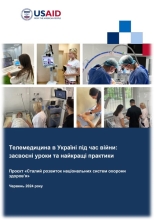
Russia’s full-scale military invasion of Ukraine has created unprecedented challenges for the country’s health care system. Significant destruction of health care infrastructure has limited access to health services, and massive displacements of people have significantly complicated the process of providing and receiving health services. This context has given rise to an urgent need to provide health services, especially in remote and frontline areas where traditional in-person access to health services is severely limited or impossible.
This report analyzes the experience of introducing telemedicine solutions with the technical assistance of LHSS in Ukraine. It highlights the results, analyzes the experience, and presents best practices, challenges, and lessons learned. Additionally, this report provides recommendations for further utilization of extant and future telemedicine solutions both during martial law and after its repeal. The information presented in the report is intended to be useful for central and local authorities, health facilities, and telemedicine solution providers. It will also be of interest to those who wish to start using telemedicine solutions in the delivery of health services.
This brief highlights Timor-Leste's health progress over the last two decades. It provides an analysis of government expenditures and offers recommendations to improve PHC financing, budget execution, and service quality. The focus is on enhancing financial protection, increasing resource management efficiency, and ensuring sustainable investments in PHC to advance health outcomes and universal health coverage.
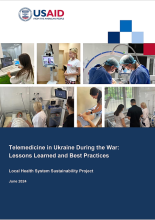
Russia’s full-scale military invasion of Ukraine has created unprecedented challenges for the country’s health care system. Significant destruction of health care infrastructure has limited access to health services, and massive displacements of people have significantly complicated the process of providing and receiving health services. This context has given rise to an urgent need to provide health services, especially in remote and frontline areas where traditional in-person access to health services is severely limited or impossible.
This report analyzes the experience of introducing telemedicine solutions with the technical assistance of LHSS in Ukraine. It highlights the results, analyzes the experience, and presents best practices, challenges, and lessons learned. Additionally, this report provides recommendations for further utilization of extant and future telemedicine solutions both during martial law and after its repeal. The information presented in the report is intended to be useful for central and local authorities, health facilities, and telemedicine solution providers. It will also be of interest to those who wish to start using telemedicine solutions in the delivery of health services.
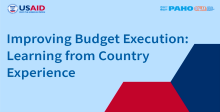
This course is an interactive, four module, online self-study course on processes used by countries to set health priorities that are reflected in national health policies. Each module allows participants to engage with the materials and reflect on their own country’s context.
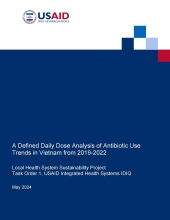
Explore our latest report on antimicrobial resistance (AMR) in Vietnam, which provides an in-depth analysis of antibiotic use and resistance patterns from 2019 to 2022 by using the database from the Social Health Insurance (SHI) system at the country level. This study, undertaken by the Local Health System Sustainability (LHSS) project in collaboration with Vietnam Social Security (VSS), offers valuable insights into the trends of antimicrobial consumption, including data on Defined Daily Doses (DDD), cost implications, and the impact of the COVID-19 pandemic on prescribing practices.

LHSS Jordan collaborated with the Laboratories Directorate to deliver a robust capacity-building program, equipping staff with essential training and preparing laboratories for accreditation. This effort included implementing an integrated quality management system that aligns with international accreditation standards
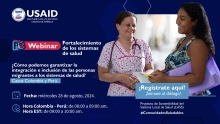
In Colombia and Peru, integrating migrants into national health systems is challenging due to inequalities in access and limited resources. This event aims to discuss the knowledge and expectations needed to effectively implement promising practices in different contexts, helping address these challenges and improve health equity for migrant populations.
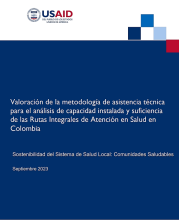
El documento presenta una evaluación de la metodología desarrollada para apoyar a los prestadores de servicios de salud en el uso de una herramienta web. Esta herramienta permite analizar la capacidad instalada y suficiencia para la implementación de las Rutas Integrales de Atención en Salud (RIAS), específicamente las rutas de Promoción y Mantenimiento de la Salud (RPMS) y Materno-Perinatal (RIAMP). La metodología fue validada en cinco territorios priorizados: Barranquilla, Bucaramanga, Cúcuta, Riohacha y Santa Marta. Los resultados mostraron una alta aprobación de los materiales y sesiones de asistencia técnica, con un 92,9% de los participantes calificando positivamente. Se destacaron recomendaciones para mejorar el proceso, como asegurar la disponibilidad de tiempo para los participantes y garantizar el acceso a la herramienta durante las sesiones. La metodología validada será utilizada por el Ministerio de Salud y Protección Social para apoyar a los prestadores en la implementación de las RIAS

In this webinar, a panel was held where both national and local experiences on managing information and knowledge regarding the migrant population were presented, with perspectives from Migración Colombia, the Ministry of Health, and the Bogotá Health Secretariat.
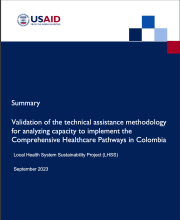
The Comprehensive Healthcare Pathways (RIAS) are policy instruments used to deliver primary health care services in Colombia, with a focus on two priority pathways - Health Promotion and Prevention (RPMS) and Maternal-Perinatal Health Care (RIAMP). To support implementation, the Local Health System Sustainability (LHSS) project developed a web tool for analyzing primary care providers' capacity to deliver these pathways. LHSS then created and validated a methodology for the Ministry of Health to provide technical assistance to providers on using this tool. The validation was conducted in three phases across five territories, involving developing materials, testing with provider teams, and incorporating feedback. Results showed high approval ratings for the technical assistance sessions, with over 90% of participants agreeing or strongly agreeing with positive statements about the methodology. Some recommendations were made to improve the process, such as ensuring participant availability and tailoring content to different provider types.
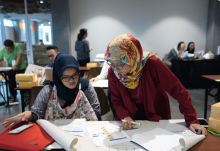
While health systems practitioners aren’t going out to sea with men named Ishmael, we chase our own white whale: evidence. Evidence that health systems interventions impact the availability, affordability, and accessibility of healthcare.
